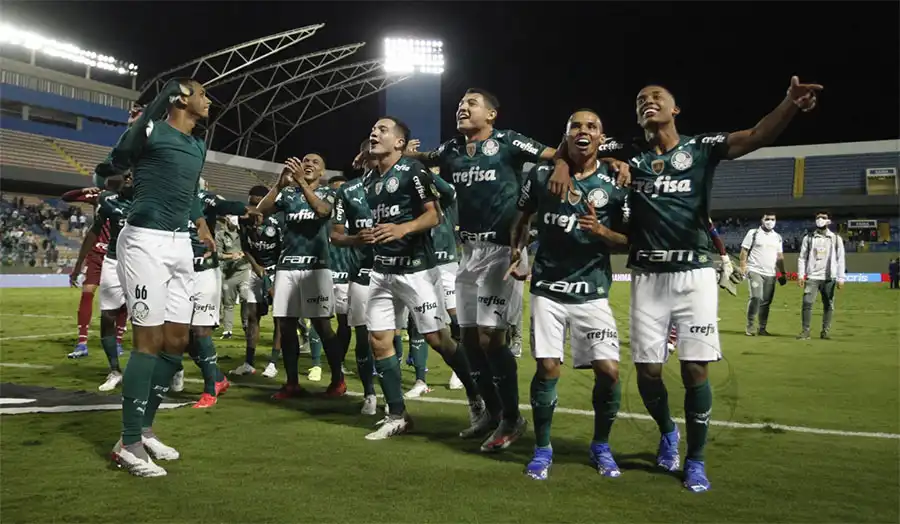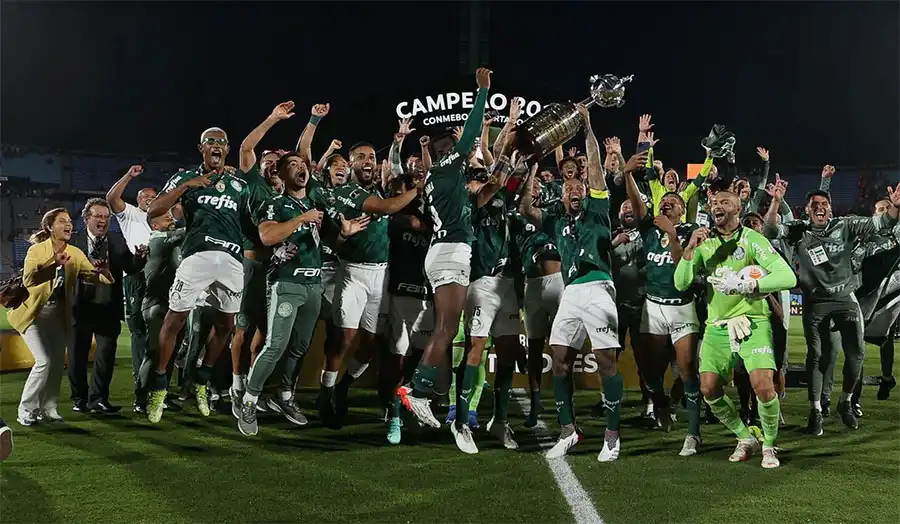Sociedade Esportiva Palmeiras, more commonly known simply as Palmeiras, is one of the most iconic and successful football clubs in Brazil and South America. Based in São Paulo and founded in 1914, the club has earned a legendary status thanks to its historic roots, impressive trophy cabinet, and ability to reinvent itself across generations. Known affectionately as “Verdão” (The Big Green), Palmeiras continues to be a symbol of tradition, passion, and excellence in Brazilian football. Learn more about the team through this article with wintips.
Palmeiras FC: Who they are and where they come from
Palmeiras was originally founded on August 26, 1914, by a group of Italian immigrants in São Paulo. The club was initially called Palestra Italia, representing the pride and unity of the Italian community in Brazil. For decades, the club thrived under this name, quickly becoming a force in the regional Campeonato Paulista.

However, during World War II, Brazil joined the Allied forces and banned organizations with Axis ties, forcing the club to change its name. In 1942, the name Palmeiras was adopted - a new identity that retained its heritage while embracing a broader Brazilian spirit. That same year, under its new name, Palmeiras defeated rivals São Paulo FC to win the Campeonato Paulista, a symbolic moment that launched a new era.
Decades of domestic dominance
Palmeiras has earned a place in history as Brazil’s most successful club in the national league. The team has won the Campeonato Brasileiro Série A a record 11 times, with titles spanning from the inaugural tournament in 1960 to their most recent triumph in 2023. These victories underline the club's consistency and adaptability through generations of footballing evolution.
In addition to league success, Palmeiras has lifted multiple Copa do Brasil trophies and over 20 Campeonato Paulista titles, asserting its dominance in both national and state competitions. The club also boasts a Supercopa do Brasil title and has consistently qualified for the Copa Libertadores thanks to its domestic performances.
Continental success and global recognition
Palmeiras’ reputation extends far beyond Brazilian borders. The club is a three-time winner of the Copa Libertadores, South America’s most prestigious club competition. They first lifted the trophy in 1999, led by legendary players like Alex and Marcos. After a brief continental drought, Palmeiras surged back to win back-to-back Libertadores titles in 2020 and 2021 under Portuguese coach Abel Ferreira.

In 2022, Palmeiras added the Recopa Sudamericana to its collection by defeating Athletico Paranaense, further cementing its continental credentials. The club also finished as FIFA Club World Cup runners-up in 1999 and 2021, falling just short of becoming world champions.
Interestingly, Palmeiras also won the Copa Rio Internacional in 1951, which many regard as the first true intercontinental club tournament, a title FIFA later recognized as a precursor to the modern Club World Cup.
Allianz Parque - The Green Fortress
Palmeiras plays its home matches at the stunning Allianz Parque, one of the most modern football stadiums in South America. Opened in 2014 on the site of the club’s historic Palestra Itália stadium, Allianz Parque has a capacity of around 43,000 and offers a top-tier experience for fans and players alike.

With its sleek design, high-tech facilities, and deafening atmosphere, the stadium has become a fortress where Palmeiras has enjoyed much of its recent success. It also hosts concerts and events, making it a landmark in São Paulo's sporting and cultural scene.
Legends and Icons of Palmeiras
Throughout its history, Palmeiras has produced and attracted numerous football legends:
- Ademir da Guia - The greatest Palmeiras player of all time, known as “The Divine” for his elegance and intelligence on the field.
- Marcos - The 2002 World Cup-winning goalkeeper, idolized for his loyalty and heroic saves.
- Djalma Santos - One of the best right-backs in football history.
- Edmundo, Evair, and Alex - Key figures in the club's golden years of the 1990s.
In the modern era, players like Dudu, Raphael Veiga, and Gustavo Gómez have become fan favorites and pillars of Palmeiras’ recent dominance.
Palmeiras is also known for its strong youth academy, which produced the likes of Gabriel Jesus and more recently, Endrick, a teenage prodigy who has already signed a deal to join Real Madrid in 2024.
The Abel Ferreira Era and current squad
Since his arrival in 2020, Portuguese manager Abel Ferreira has transformed Palmeiras into a tactical and mental powerhouse. Known for his flexible formations and intelligent match management, Ferreira has guided the club to multiple Libertadores and domestic titles in just a few years.
Heading into the 2025 season, Palmeiras boasts a deep and well-balanced squad. Key players include:
- Gustavo Gómez - The team captain and defensive leader from Paraguay
- Raphael Veiga - Creative midfielder and penalty specialist
- Weverton - Brazil international goalkeeper
- Murilo, Zé Rafael, and Gabriel Menino - Reliable core players
- Endrick - The exciting young forward who continues to shine before his move to Europe
This combination of experienced leaders, youth products, and tactical cohesion makes Palmeiras one of the strongest squads in South America.
Future outlook and global aspirations
Palmeiras is not just a club of the past and present, it is a club with a bold vision for the future. With financial stability, a clear football philosophy, and investment in infrastructure and youth development, the club is well-positioned to dominate both in Brazil and on the continental stage for years to come.
Their ambitions also include winning the elusive FIFA Club World Cup and solidifying their place among the world’s elite. With rising talents like Endrick and a steady hand in Abel Ferreira, Verdão looks set to write many more chapters in its legendary story.
Conclusion
Palmeiras is more than just a football team, it is a symbol of tradition, pride, and excellence in Brazilian and South American football. From its immigrant roots to modern continental glory, the club’s journey is a story of reinvention and resilience. With a record number of national titles, three Copa Libertadores trophies, and a fanbase that spans the globe, Palmeiras continues to shine as one of football’s most respected and successful institutions.
See more: Ranking the top 8 Palmeiras best players of all time







